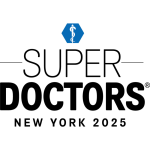Acne Treatments
Control of acne is an ongoing process given that acne can be a chronic problem. All acne treatments work to reduce current acne pimples but work better at preventing new acne breakouts. Acne treatments usually take 6 to 12 weeks to become fully effective. During that time existing blemishes may take time to heal and you may experience temporary worsening before improvement. Chemical peels and laser treatments can speed the time to improvement and often help clear pigmentation and scars. . Your treatment will vary according to the type of acne i.e. acne cysts, pustules, whiteheads or blackheads.
Occasionally, an acne-like rash can be due to another cause such as make-up or lotions, or from oral medication. It is important to help Dr. Robinson by providing an updated history of what you are using on your skin or taking internally. Many non-prescription acne lotions and creams help mild cases of acne. However, many will also make your skin dry. Follow instructions carefully.
Topicals
- Dr. Robinson may prescribe topical creams, gels, lotions with vitamin A acid-like drugs, benzoyl peroxide, or antibiotics to help unblock the pores and reduce bacteria. These products may cause some drying and peeling. They will advise you about correct usage and how to handle side effects.
- Before starting any medication, even topical medications, inform your doctor if you are pregnant or nursing, or if you are trying to get pregnant.
Special Treatments
- Acne surgery may be used by Dr. Robinson to remove blackheads and whiteheads. Do not pick, scratch, pop, or squeeze pimples yourself. When the pimples are squeezed, more redness, swelling, inflammation, pigmentation and scarring may result.
- Lasers and microdermabrasion may be used to remove the upper layers of the skin improving irregularities in the surface, contour, and generating new skin.
- Light chemical peels with salicylic acid or glycolic acid help to unblock the pores, open the blackheads and whiteheads, stimulate new skin growth and improve pigmentation (dark spots).
- Injections of corticosteroids may be used for treating large red bumps (acne cysts). This may help them go away quickly and prevent scarring.
Oral
- Antibiotics taken by mouth such as tetracycline, doxycycline, minocycline, or erythromycin are often prescribed for acne cyst or painful acne pimples.
Birth Control Pills
- Birth control pills may significantly improve acne, and may be used specifically for the treatment of acne. It is also important to know that oral antibiotics may decrease the effectiveness of birth control pills. This is uncommon, but possible, especially if you notice break-through bleeding. As a precautionary measure use a second form of birth control.
Other Treatments
- In cases of unresponsive or severe acne, Accutane (isotretinoin) may be used. Patients using isotretinoin must understand the side effects of this drug. Monitoring with frequent follow-up visits is necessary. Pregnancy must be prevented while taking the medication, since the drug causes birth defects.
- Women may also use female hormones or medications that decrease the effects of male hormones to help their acne.
- Laser, microdermabrasion and chemical peels can be helpful in treating acne as well.
Dr. Robinson will evaluate your ance and suggest the best treatment regimes considering your age, sex, and the type of acne you have.
Treatment of Acne Scarring
Dr. Robinson can treat acne scars by a variety of methods. Skin resurfacing with laser, dermabrasion, chemical peels, or electrosurgery can flatten depressed scars. Soft tissue elevation with subcision or filling agents such as Radiesse, Restyene, Juvederm, Cosmoderm or Cosmoplast can elevate scars. Scar revision with microexcision and punch grafting can correct pitted scars. Combinations of these surgical treatments can make a noticeable difference in appearance.



